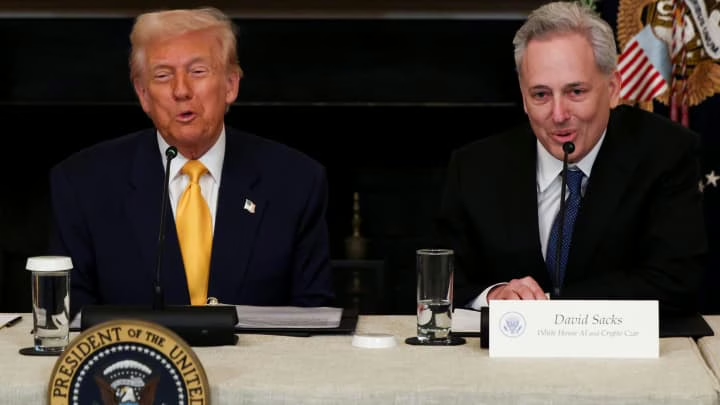US AI and Crypto Czar David Sacks Denies Breaching Federal Service Limit Amid Scrutiny
Contents
Toggle- Quick Breakdown
- Industry expectationsLawmakers question Sack’s eligibility
- Concerns over conflicts of interest
Quick Breakdown
- David Sacks denies breaching his 130-day service cap as a special government employee.
- Lawmakers led by Elizabeth Warren allege Sacks may have exceeded his federal appointment limit.
- Concerns center on Sacks’ financial ties to crypto and AI firms he helps regulate.
A spokesperson for David Sacks, the White House’s special advisor for artificial intelligence and cryptocurrency, has rejected claims that he may have exceeded his 130-day service limit as a special government employee (SGE).
Speaking to CNBC on Wednesday, the spokesperson insisted that Sacks carefully tracks his service days to remain compliant with federal rules, noting that the 130 days “do not have to be consecutive.”
 Source:
CNBC
Source:
CNBC
The lawmakers argue this puts him in a position where his policy influence could directly benefit his own financial interests. The White House has waived certain ethics restrictions, allowing Sacks to retain these investments.
Although Sacks previously claimed he sold his crypto holdings before Trump’s inauguration, Warren pressed him in March to provide evidence of the divestment. She also expressed concerns that Trump and “other private individuals” could profit from the administration’s digital asset policies.
Industry expectationsLawmakers question Sack’s eligibility
Concerns over Sacks’ role were raised this week by Senator Elizabeth Warren and a group of bipartisan lawmakers, who questioned whether he had surpassed the federal limit.
In a letter signed on Wednesday by Warren, four other senators, and three members of Congress, the lawmakers wrote,
“We are investigating whether you may have exceeded the time limit for serving in your temporary role as the White House’s Special Advisor for AI and Crypto.”
The 130-day restriction for SGEs was designed to prevent conflicts of interest, as individuals often maintain private-sector positions while serving temporarily in government. Since President Donald Trump’s inauguration on January 20, a total of 167 weekdays have passed (excluding public holidays). To stay compliant, Sacks would have needed to take at least 37 days off during that time.
Concerns over conflicts of interest
Warren and her colleagues also highlighted Sacks’ ties to the industries he now helps regulate. Through his venture firm Craft Ventures and other holdings, he has invested heavily in crypto and AI startups.
Sacks’ appointment in December 2024 was welcomed by many in the crypto sector, with industry watchers speculating he could push forward favourable regulatory policies ahead of the 2026 midterm elections. However, mounting questions from lawmakers suggest his tenure could become increasingly contentious.
Take control of your crypto portfolio with MARKETS PRO, DeFi Planet’s suite of analytics tools.”
Disclaimer: The content of this article solely reflects the author's opinion and does not represent the platform in any capacity. This article is not intended to serve as a reference for making investment decisions.
You may also like
Bitcoin repeats May breakout move as analysis expects $118K showdown
Chainlink sees best performance since 2021 as cup-and-handle targets $100 LINK
Solana’s (SOL) next stop could be $300: Here’s why
Ethereum Tests Support as Holder Conviction Sets Stage for Rebound

